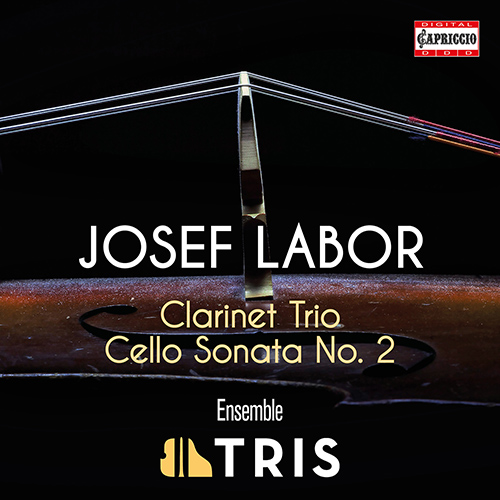LABOR, J.: Trio No. 1 for Clarinet, Cello and Piano Left Hand / Cello Sonata No. 2 with Piano Left Hand (Ensemble TRIS)
Tracklist
Busch, Holger (piano)
Busch, Holger (piano)
Busch, Holger (piano)
Busch, Holger (piano)
Josef Labor was born on June 29, 1842 in Horowitz (Beroun region, Bohemia), where his father ran a factory. Both his parents were from Vienna. His father, who composed music himself in his early years, was among Franz Schubert’s circle of friends there. At the age of three Labor lost his vision due to smallpox. After his parents separated, his mother moved back to Vienna with her three children. From 1848, Labor received lessons there, at the local institute for the blind, where his musical talent was quickly recognized and fostered. His musical training began in 1857 at the Conservatory of the Society of Friends of Music, including with Simon Sechter in composition and Eduard Pirkhert on the piano. From 1863 he appeared publicly as a pianist, and later (from 1879) mainly as an organist. Concert tours took him all over Europe. In the process he gained his reputation as a pianist less through virtuosity than through his touch and as a sensitive interpreter of Mozart and Beethoven’s works in particular. As an organist, he was soon considered second only to Anton Bruckner. Unlike Bruckner, he did not perform as an improviser; his focus was on non-liturgical organ music. At the center, of course, was Bach, but also (at that time a novelty) earlier organ composers such as Buxtehude and Sweelinck.
In 1863 Labor arrived in Hanover, where the likewise blind King George V of Hanover appointed him court pianist in 1895. There Labor often performed with Joseph Joachim, who was also engaged in Hanover. The two formed a lifelong friendship and later frequently performed concerts together. Labor often submitted his compositions to Joachim for review. In 1866 he followed the deposed king into exile in Vienna, which from then on became the center of his activities. In addition to his concert career, he taught for over thirty years at the Jewish Institute for the Blind as well as at other Viennese music schools (including as the piano teacher of Arnold Schoenberg and Alma Schindler/Mahler), and as a private instructor of composition (his students included Julius Bittner and Paul Wittgenstein). His interest in early music also led him to work on the Monuments of Fine Austrian Music, writing the continuo part for Guido Adler’s groundbreaking edition of Cesti’s opera Il pomo d’oro and for the edition of Heinrich Biber’s violin sonatas. In addition, he found time to compose. Due to his blindness he was dependent on the help of other people (usually his sister Josefine or his partner Rosine Menzel), both for the study of other composers’ works and for writing down his own compositions when they were not works for solo piano or organ; because of this circumstance, his work as a composer was subjected to limits from the outset.
After the death of King George in 1879, Labor found a new patron in the industrial magnate Karl Wittgenstein (1847–1913), who considered Labor to be among the most important composers of his time and in whose house Labor met other leading musicians such as Richard Strauss, Gustav Mahler, and Pablo Casals.
The final years of Labor’s life were characterized by great public recognition (even veneration) which he enjoyed in Vienna on the one hand, and by personal tragedy on the other. His partner Rosine Menzl died unexpectedly in 1920, followed by his older sister Josefine in 1922. Both had been his main assistants who had written down his musical dictations up to then. In his grief, Labor was initially unable to compose further. In any case, no other works survive from the year 1922. Labor had the strength to emerge from his grief and to write his last, sunny Concert Piece III in 1923. On February 28 1924 his heart stopped beating as a consequence of the flu. He was buried with great honors in Vienna’s Central Cemetery, and a monument to him was unveiled in front of the Konzerthaus in 1928.































